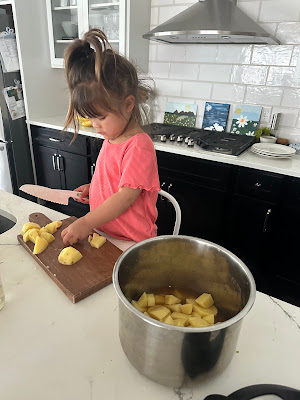"A Martha becomes a Mary on Shabbat."
-Rabbi Greg Hershberg
The first thing I prepare when hosting a party or Shabbat dinner isn’t the food, it’s my heart. There were countless times when my family lived in quiet misery because I carried unrealistic expectations without a solid plan. I'd be frantically cooking, angrily cleaning, and barking orders. We’d all regroup and force smiles before the door opened, only to end the evening with bitterness as part of the mess we had to clean up.
It’s hard to enjoy a sacred meal when I come to the table with a prideful “I did all the work” attitude, while everyone else walks on eggshells, eating guiltily. In a home where chaos reigns and planning is absent, even daily cooking or hosting can become a burden instead of a blessing.
Over time, I learned that rest comes more easily when it’s preceded by preparation. Creating a written plan freed my mind from stress, provided direction, and allowed me to pivot when things didn’t go as expected. A plan gave everyone clarity: what needs to be done, who’s doing what and by when. It also helped us spread the workload across days instead of cramming everything into one overwhelming sprint.
In Exodus, we see this kind of intentional preparation tied to the first Shabbat meal:
“Now on the sixth day they gathered twice as much bread, two omers for each one… ‘This is what the Lord meant: Tomorrow is a Sabbath observance, a holy Sabbath to the Lord. Bake what you will bake and boil what you will boil, and all that is left over put aside to be kept until morning.’ So they put it aside until morning, as Moses had ordered, and it did not stink nor was there a maggot in it.” — Exodus 16:22–24
There was planning and purpose. They gathered extra and prepared it ahead of time. The Lord preserved what they had prepared in honor of the Sabbath.
When I prepare for Shabbat, I now do so both physically and spiritually. I block out the day on our calendar and avoid scheduling anything else that might compete with it. I spend time in Scripture throughout the week so I can share what God has been showing me. I see it as gathering spiritual manna to nourish my family not just with food, but with truth.
Planning the meal and setting the table in advance allows me to enter dinner undistracted and present. What once felt like a chaotic scramble is now a rhythm and a ritual that brings peace to our home. When we sit at the table with the candles lit, we soak in the beauty and meaning of each sacrament.
Candles
Two candles represent the dual command to remember and observe the Sabbath (Exodus 20:8). Lighting them marks a shift from busyness into sacred rest, inviting God’s peace, joy and the presence of the Holy Spirit who is often symbolized by fire into our home. The prayer reminds us that we are called to be light in the world. Traditionally, the woman of the house lights the candles, as she is seen as the creator of a joy fiilled, serene home.
Tzedakah Box
Tzedakah means charity, with roots in justice and righteousness. This box reminds us that we give because we’ve been blessed and giving is a joyful, moral obligation. This box reminds us that God has blessed us and we have so that we can give.
Grape Juice
Wine or juice sets the tone for celebration. It symbolizes God’s provision and reminds us of Jesus, who shed His blood as atonement for our sins.
Wipes (Handwashing)
Most households probably use a bowl with water and a towel, but in our household we pass the wipes to signify the handwashing. Some, including myself, see the Shabbat table as a symbol of the altar and the handwashing as a way to prepare to partake in a sacred meal. It reminds us that Jesus washes away the sins of the world.
Bread (Challah)
The Challah is particularly special to me because I love preparing it. Challah holds deep significance. Traditionally, women pray over the dough as they knead, interceding for those who will eat. Two loaves represent the double portion of manna given before Shabbat in the wilderness. The braided form symbolizes unity, and the bread itself is a reminder of Jesus, who gave His body for us.
For more details of how I plan for the Shabbat meal check back in next week.
For a brief overview of Significance, overview and printout of the prayers you can click on the link HERE.































